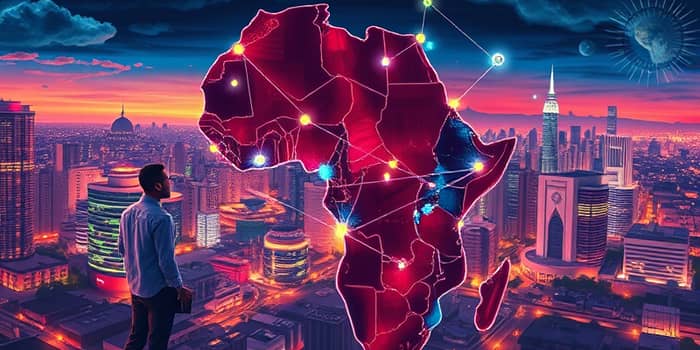
Across Africa, a digital revolution quietly unfolds, reshaping economies and communities from Lagos to Kigali. Fueled by a combination of young and ambitious population dynamics, strategic investments, and innovative solutions, these emerging centers are turning challenges into opportunities. From unprecedented funding rounds to grassroots developer meetups, the ecosystem’s momentum reflects a profound shift in how innovation is nurtured across the continent.
By 2025, several cities stand out as innovation epicenters. According to the Dealroom Global Tech Ecosystem Index, Lagos, Nairobi, and Johannesburg rank among the world’s fastest-growing tech ecosystems. Kampala, Dakar, Accra, Cairo, Kigali, Addis Ababa, and Kinshasa also appear on the radar, each contributing unique strengths. Together, these hubs illustrate a diverse and geographically widespread network driving digital transformation.
While Lagos dominates funding inflows and unicorn creation, other cities excel in specialized niches. Nairobi’s agritech and mobile money solutions, Cape Town’s cybersecurity startups, and Accra’s healthtech ventures highlight the continent’s multifaceted digital future.
Across these hubs, certain sectors stand out for their capacity to address real-world problems and deliver scalable models:
From agricultural marketplaces to mobile health clinics, startups are breaking barriers and connecting communities with technology in unprecedented ways.
African tech growth is propelled by several powerful underlying forces.
First, the continent’s population is among the youngest globally, with a median age under 20. This tech-savvy and rapidly growing talent pool offers a constant supply of creative energy and entrepreneurial ambition.
Second, urbanization is accelerating. As more Africans move to cities, demand for digital services—from ride-hailing to e-learning—increases dramatically, fostering new business models and local adaptations of global technologies.
Third, improvements in digital infrastructure have lowered barriers to entry. Mobile broadband coverage now reaches more than 65% of the population, and community networks are emerging in underserved areas, supported by international partnerships and private investment.
Finally, regulatory landscapes are gradually adapting. Over the past five years, many governments have implemented startup-friendly policies, tax incentives, and innovation grants, helping to formalize the sector and attract foreign capital even amid policy fragmentation.
Despite remarkable progress, entrepreneurs must navigate persistent obstacles.
These challenges underscore the importance of adaptive business models, strong local partnerships, and diversified revenue streams to weather external shocks.
A vibrant network of events, spaces, and mentorship programs nurtures growth at every stage:
These ecosystem pillars foster collaboration, share best practices, and catalyze the next wave of scalable African startups.
Tech-driven growth carries profound socio-economic impacts and long-term promise.
Sub-Saharan Africa’s GDP growth is projected at 3.5% in 2025, accelerating to 4.3% by 2027, with digital startups as central drivers. As they scale, these companies contribute to tax revenues, foreign exchange earnings, and the formalization of previously informal markets.
Youth unemployment, often exceeding 30% in many countries, is addressed through direct job creation and skills training. Partnerships between universities, coding bootcamps, and corporations are equipping tens of thousands of young Africans with in-demand digital skills.
Real estate markets in major cities have seen booms. Innovation districts and tech parks fuel property development and local commerce, while infrastructure projects—such as data centers and fiber deployments—lay the groundwork for sustained growth.
Inclusion also advances. Digital payment platforms serve millions of unbanked customers, telemedicine apps reach rural clinics, and e-learning platforms democratize access to quality education.
Looking forward, Africa’s ability to leapfrog traditional legacy infrastructure uniquely positions it for green and inclusive digital transformation. Off-grid solar microgrids, drone-based logistics, and blockchain supply chains promise to solve persistent challenges while bypassing traditional bottlenecks.
International partnerships will remain crucial. Growing collaboration with European and Asian investors and development agencies is expected to bring new capital, mentorship, and market access opportunities. Meanwhile, regional bodies are working toward regulatory harmonization, facilitating greater ease of cross-border scaling.
Each hub offers a distinct narrative of innovation and resilience.
In Lagos, companies like Flutterwave and OPay have revolutionized cross-border payments, while Andela has trained thousands of developers for global clients. Paystack’s acquisition by Stripe for $200 million marked a watershed moment for African fintech.
Nairobi’s ecosystem thrives on M-Pesa’s mobile money legacy and startups such as Twiga Foods, which optimizes agricultural supply chains. Healthtech ventures like mPharma ensure essential medicines reach remote clinics, demonstrating profound social impact.
Cape Town and Johannesburg blend corporate R&D with grassroots innovation. Aerobotics uses AI-driven robotics to monitor crop health, Yoco empowers small merchants with digital payments, and Ushahidi’s crowd-mapping tools have been deployed in crises worldwide.
Emerging players in Accra, Dakar, and Kigali are leveraging localized expertise—whether in mobile logistics, renewable energy, or fintech—to address domestic challenges and export solutions abroad. Their journeys highlight resilience and creative problem-solving as key ingredients for success.
In conclusion, the quiet rise of African tech hubs is no fleeting trend. It is a testament to the continent’s resilience, creativity, and capacity to transform adversity into opportunity. By understanding these ecosystems’ complex dynamics—spanning demographics, infrastructure, policy, and community support—stakeholders can nurture sustainable, impactful growth that benefits not only investors but millions of African citizens.
References













